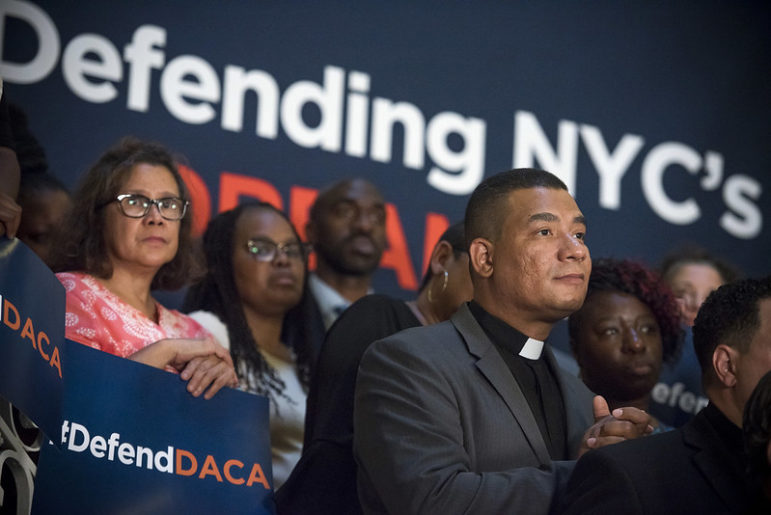What the candidates are saying so far — and what advocates hope they will eventually talk about.

Ed Reed/Mayoral Photography Office
A pro-DACA meeting in 2017.This article originally appeared in Spanish.
Lea la versión en español aquí
An estimated 3.1 million immigrants live in New York City—a huge presence in the population that is so far not reflected in the 2021 mayoral candidates’ speeches or campaign literature.
Several Democratic candidates make only token mention of immigration or immigrant communities. Only a few dedicate a section of their platform to the matter. Words like “immigration,” “immigrants” or “immigrant communities” rarely appear in the candidates’ plans for housing, public safety, or other policy areas.
And in a city where nearly half of residents speak a language other than English at home and a contest in which candidates acknowledge there are real language barriers, only Dianne Morales has a fully trilingual platform (English, Spanish and Chinese). Scott Stringer and Loree Sutton each have a fully bilingual platform (English and Spanish) and Raymond McGuire, Shaun Donovan, and Maya Wiley have a page with an option for Spanish where only their bio is translated, not their proposals.
That is why City Limits presents below a compendium of the points where immigrants are mentioned in the various candidates’ plans, direct answers given by candidates to questions about immigration from City Limits, and ideas from advocates on what the mayoral hopefuls should—eventually—discuss.
NYPD monitoring and legal assistance
While most candidates have said little, advocates and experts already have many ideas about how New York City can improve policies affecting immigrants.
Last week, for example, Make the Road New York and The Kathryn O. Greenberg Immigration Justice Clinic at Benjamin N. Cardozo School of Law released a roadmap that puts together a series of recommendations for mayoral candidates on how to protect New York’s immigrant communities.
At least one candidate is ready to seize on those ideas. “Everything in there is the way to engage the immigrant community,” says Brooklyn Councilmember and mayoral candidate Carlos Menchaca by phone, who added that he would welcome all the roadmap’s suggestions.
Immigrant advocates would like to see more oversight and monitoring of how the NYPD and federal immigration agents have interacted and whether city resources have been used to support that cooperation, even though it is prohibited in theory.
New York Civil Liberties Union advocates say they would like to see, first and foremost, that the next mayor maintains existing rules, such as Local Law 228, which prohibits city agents from cooperating with ICE or federal immigration agents.
There is also room to expand protections and to solidify prohibitions through repealing exceptions that in certain cases allow federal immigration agents to know the release date of a person in NYPD custody.
Donovan, Menchaca, Morales, Stringer, Wiley, Andrew Yang and long-shot candidate Aaron Foldenauer speak explicitly in their platforms about protecting New York immigrants from ICE’s repression. Wiley, for example, proposes creating mechanisms to ensure accountability. “Accountability will be a lead responsibility of oversight over policing and also for the Mayor’s Office of Criminal Justice in partnership with the Mayor’s Office of Immigrant Affairs,” her campaign says.
Menchaca, Yang, Morales, and Kathryn Garcia explicitly discuss the idea of New York as a “sanctuary city” and safe space for immigrants. Yang talks about maintaining the New York Immigrant Family Unity Project (NYIFUP), an advocacy program for detained immigrants facing deportation. Wiley, Yang, Morales, and Menchaca want to expand this program.
For Hasan Shafiqullah, attorney in charge of the Legal Aid Society’s immigration unit, it is important that these types of programs continue. Right now, NYIFUP is “is a Council discretionary program,” says Shafiqullah, meaning it is subject to annual budget anxiety. To ensure the program’s continuity, Menchaca would include it in the “budget as a baseline with a three-year contract,” he says by phone.
Another program that immigrant advocates would like to see strengthened is the Immigrant Children Advocates Relief Effort (ICARE), which provides defense against the removal of unaccompanied minor children, which is also funded at the discretion of the Council. A third program that Shafiqullah would like the next mayor to continue to support is the Immigrant Opportunities Initiative (IOI), which provides defense for immigrants facing deportation who are not detained, as well as assistance with immigration benefits. Menchaca and Morales want to “expand funding to also include non-detained immigrants to be able to access free legal services,” Morales responded by email.
Candidates like Stringer and Menchaca are proposing “universal legal services” for immigrants in the city. And now that the Dream Act has been reintroduced and President Biden’s Citizenship Act is on the table, the need for such services could increase. If either bill passess, Shafiqullah warns, it will be necessary for the mayor to invest resources for organizations to help applicants with the paperwork.
“Any of these [bills] would be a logistical challenge for organizations,” Shafiqullah says. “We’re already at capacity, so the challenge is how do you do this on top of your work.” Shafiqullah recalled that in 2008, when DACA was signed as an executive order, “we only could do 75 applications a day, so it would require more resources.”
Economic support and language access
Outsider candidate Paperboy Love Prince, Menchaca, and Yang propose a universal minimum wage (UBI). Yang is betting that 500,000 needy New Yorkers would receive it while Menchaca’s plan it would reach about 450,000 people, and undocumented residents would be eligible in both plans.
Yesenia Mata, executive director of La Colmena, thinks that “another round of financial support should be provided to immigrants who were left out of the federal emergency package.” On this point Morales wants to grant basic income relief to every household, regardless of their immigration status, “for our excluded workers who were left out on the federal and state level,” her platform states and she reiterated by email.
A few candidates offer ideas for addressing language barriers.
Morales wants to launch a program called NYC5000 in which a group of multilingual translators will help the uninsured, homeless, and other vulnerable populations with information on COVID-19 education, testing, and vaccines. Stringer wants to expand city agencies’ language-access efforts, and Wiley wants all services and information to be provided in the applicants’ native language. On the other hand, Yang suggests the creation of an “NYC App” to serve New Yorkers in the language they are most comfortable with (Yang also wants all banks in the city to accept IDNYC to open a bank account).
When it comes to protecting immigrant workers, advocates “would like for the next mayor to hold accountable unscrupulous employers, particularly construction companies, who negligently cause the death of immigrant workers,” says Mata, since several immigrants have died doing construction work. Another point that Mata highlights is to “hold food delivery apps accountable by ensuring they provide livable wages to delivery workers and provide safety equipment.”
Menchaca says that he would propose laws to regulate the wages of food delivery workers, grant them health insurance, create job protections, and ensure they have access to bathrooms in the restaurants they work for.
“At City Hall, I will expand on my record as Comptroller combatting wage theft,” Stringer responded by email.
Healthcare and vaccines
Few candidates detail how their health care plans do or do not include undocumented people. Donovan, for example, would create a “public option to provide health care to the 300,000 undocumented New Yorkers who are currently uninsured,” he emails.
Stringer also mentions that he wants to strengthen healthcare services for immigrants, and Wiley thinks that “New York City and the State can lead the nation with creation of universal insurance mandates that cover everyone, regardless of immigration status,” she says via email.
To achieve universal community care, Wiley proposes creating a universal single-payer system in New York. “The devil is in the details,” she warns, “particularly in making certain the increased public financing burden is distributed and no employer reaps a windfall as result of public takeover. No worker should be required to pay more than he or she does now.”
On access to vaccines, McGuire “wants to prioritize those communities in vaccine deployment and hire community members who know their neighbors to help with outreach and education, help us reach the hardest to reach NYers, and make sure they don’t get left behind again,” he says by email.
Garcia proposes reserving “25 percent of vaccine appointments for direct referrals from community health-care providers,” and proactively calling people to schedule them for appointments.” Advocates like Mata agree that having community organizations like hers involved as partners and validators is key to getting widespread and equal distribution of the vaccine.
Immigrants’ right to vote
The question of immigrants’ right to vote, which resurfaced recently as a topic in the race, is one of the few issues where there are distinct differences among the candidates. They fall into five categories.
1. Those who openly oppose the idea, like Garcia: “I do not support the current proposed legislation for allowing non-citizens voting powers in municipal races,” she says.
2. Those who would think about or consider it, like McGuire: “If there’s anything that the last few years — and the last few months — have shown us, it’s the power of getting as many people to participate in the democratic process as possible. Ray is open to discussing this idea and any that increases voter engagement in a fair and equitable way,” his campaign says by email.
3. Those that would extend voting rights to certain immigrants, such as lawful permanent residents and other immigrants who are not citizens but are authorized to work in the United States, which is Eric Adams’ proposal.
4. Those who support allowing all people to vote, which includes Donovan, Menchaca, Morales, Wiley, and Stringer.
5. Those whose position is unclear, like Yang, who did not respond to City Limits’ questions.
Of course, having a position is one thing. Making a policy happen is another. “There are real barriers to implementing non-citizen voting,” Wiley notes. “The city does not have the authority to require non-citizen voting in state elections, they will likely require different ballots,” her campaign says. “We have all seen the dysfunction that is the Board of Elections, so we must ensure that a non-citizen voting program can be implemented safely and does not put our immigrant neighbors at risk.”
To achieve a greater level of detail in the immigration proposals of the New York City mayoral candidates, immigrant advocates want to see a panel with the candidates devoted exclusively to these issues before the June primary.









